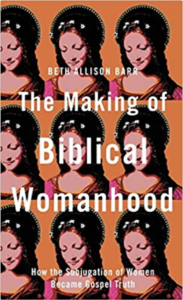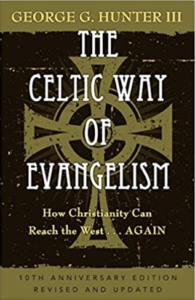
 What an eye-opening book! Growing up as a pastor’s kid in the Assemblies of God (A/G), where the ordination of women was never really an issue, I was surprised at the depth to which this book challenged me. I owe significant physical healing to a “lady evangelist” when I was two years old. The primary message of the book wasn’t an outright issue for me, and I thought I was okay in this regard. I soon discovered some blind spots.
What an eye-opening book! Growing up as a pastor’s kid in the Assemblies of God (A/G), where the ordination of women was never really an issue, I was surprised at the depth to which this book challenged me. I owe significant physical healing to a “lady evangelist” when I was two years old. The primary message of the book wasn’t an outright issue for me, and I thought I was okay in this regard. I soon discovered some blind spots.
My first challenge: Barr, a medieval and church history professor from Baylor University and a Baptist pastor’s wife, weaves her own story throughout the various arguments as she makes the following case: Complementarianism (known as biblical womanhood) is wrong.
Complementarianism is the concept that God created the male to be dominant and the female submissive (i.e., patriarchy). Barr makes a very persuasive case that patriarchy wasn’t what God intended. Patriarchy is the result of human sin. I recognized that my life, culture, church, and even my family had conditioned my perception of this relationship.
My second challenge: The A/G has recognized the role of women in ministry from its beginning. Joel’s prophecy quoted by Peter on the day of Pentecost was all it took for the young Pentecostals to embrace women in ministry (Acts 2:14-21). Indeed, they sent single women out to the far-flung regions of our world to proclaim the good news. Notable women ministers amongst early Pentecostals included Maria B. Woodworth-Etter, Aimee Semple McPherson, Alice Reynolds Flower, Anna Ziese, and Marie Burgess Brown.
Unfortunately, in the 1920s, the number of women in leadership within the Assemblies dropped significantly. I am happy to say that those numbers have now turned in recent years, and there is a strong women’s contingent amongst our ministers. Fortunately, Donna Barrett, the Assemblies of God’s General Secretary, was recently elected and proved herself a dynamic and exemplary leader on the national stage. Unfortunately, there is much to be done. Men occupy a much higher percentage of pastoral and leadership roles within the movement. This fact grieves me. We have work to do, not only in terms of equality among the sexes but racially as well. Fortunately, I was privileged to lay hands on the Lithuanian Pentecostal Church’s first ordained female pastor in 2020.
I highly recommend Barr’s well-written book.
 What is the best way to evangelize? This question is constantly on the minds of pastors, missionaries, and believers. Does evangelism need to flow through church structure and authority lines, or is a more organic, loosely formed structure the best way? Do people need to believe before they can belong? What needs to happen to create a rapid movement of people to the Gospel?
What is the best way to evangelize? This question is constantly on the minds of pastors, missionaries, and believers. Does evangelism need to flow through church structure and authority lines, or is a more organic, loosely formed structure the best way? Do people need to believe before they can belong? What needs to happen to create a rapid movement of people to the Gospel?
Hunter focuses on Patrick, more commonly known as “St. Patrick.” He describes his early life, conversion, and his ministry in Ireland to the “uncivilized.” Patrick had an “apostolic band” that would travel and form communities of faith. He did so by speaking with leaders, influencers, and those receptive to hearing the Gospel. Prayer for the sick, the possessed, conflict mediation, story-telling, and Q & A were all methods employed by Patrick. This process would go on for weeks or months until a “surprisingly indigenous” church emerged. After constructing a chapel, a baptism service took place for the church’s earliest converts. Patrick would leave a protégé behind with a kind of elementary Christian textbook.
This book is so intriguing because Patrick’s approach fits well with the missionary method we are attempting to implement. Even with all the modern and technological advances since Patrick’s day, people still need a relational approach to evangelism, discipleship, and spiritual transformation. The Celtic way of evangelism was a multi-faceted and much more organic approach than what we find in the modern church. Its ultimate goal was the transformation of people into the image of Christ. It is a fascinating read.
Gospel Fluency: Speaking the Truths of Jesus into the Everyday Stuff of Life, by Jeff Vanderstelt.
 “Everyone is an unbeliever!” What a title for chapter one! The author explains:
“Everyone is an unbeliever!” What a title for chapter one! The author explains:
When I say we are all unbelievers, I mean we still have places in our lives where we don’t believe God. There are spaces where we don’t trust his word and don’t believe that what he accomplished in Jesus Christ is enough to deal with our past or what we are facing in this moment or the next.
Throughout the book, Vanderstelt makes his case that the Gospel applies not only to get us into heaven but also for the everyday stuff of life. When we become followers of Jesus, we believe that Jesus’ work on the cross is sufficient for us. He forgives us and changes our identity from sinner to saint, from failure to faithful, bad to good, and even righteous and holy. Yet, we forget about what he has said about me, what he has done for me. Sometimes that isn’t just forgetfulness. It is unbelief. I know these things; I don’t believe them (location 178).
Vanderstelt then discusses fluency. Fluency is a difficult thing to define, but he sums it up clearly: “The new language becomes the filter through which you perceive the world and help others perceive your world and theirs” (Location 434). Lots of missiological insight there.
In the following three sections, he outlines the Gospel in three areas: in me, with us, to others. His basic premise is that immersion into a missional community that speaks the Gospel fluently is the best way to apply the Gospel to people’s lives so they can continue to grow into Christ-likeness and share this Gospel with those around them. We must speak the Gospel a lot! We need to hear it. We need to be immersed in it. We need to love it.
Gospel Fluency is an easy-to-read book about applying the Gospel to our lives and the lives of others. I strongly recommend this book, and I look forward to picking up the accompanying Gospel Fluency Handbook.

14125 Louisiana Ave S.
Unit 13223
Savage, MN 55378
Contact Info
How can you help?
Assemblies of God World Missions
Springfield, MO 65802
Account #249169

14125 Louisiana Ave S.
Unit 13223
Savage, MN 55378
Assemblies of God World Missions
Springfield, MO 65802
Account #249169
